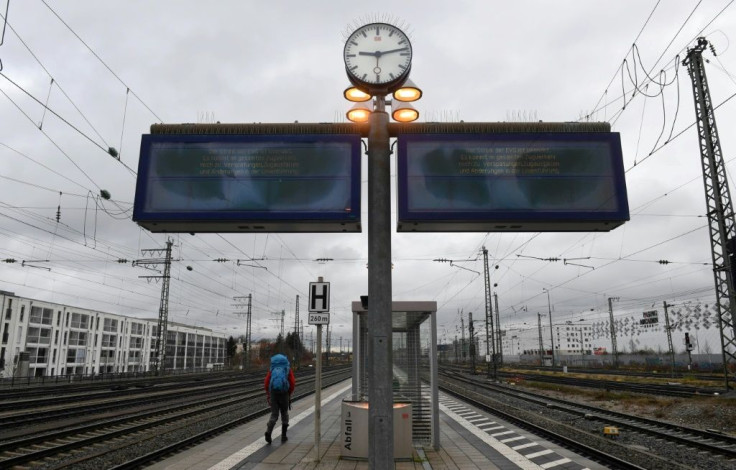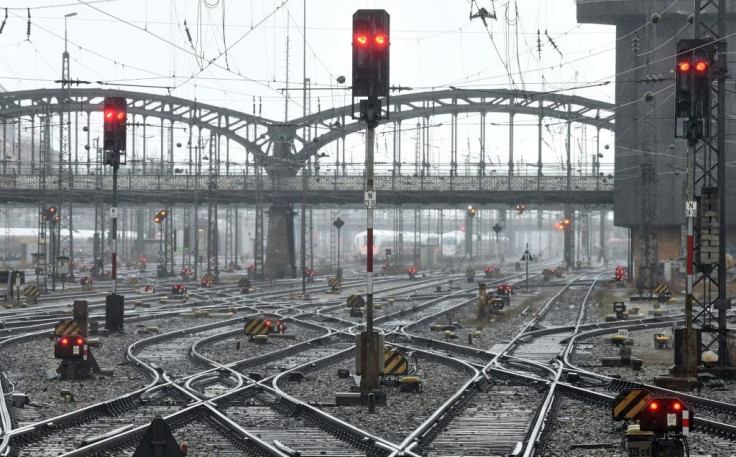German Train Drivers Go On Strike As Wage Dispute Escalates
German train drivers went on strike over wages from Tuesday, dealing a blow to summer holidaymakers and adding to logistics and supply problems already plaguing the industry.
Only one in four long-distance trains will be in service on Wednesday and Thursday, as the walkout began with cargo trains from 7:00 pm (1700 GMT) on Tuesday and is scheduled to extend to the passenger network seven hours later.
Some 95 percent of union members had voted for the first round of industrial action, which is due to end on Friday, said the leader of the GDL train drivers' union, Claus Weselsky.
Deutsche Bahn blasted the move as an "unnecessary escalation on the back of rail customers".
"Just as people are travelling more again and using trains, GDL leaders are destroying the upswing that we urgently need given the huge damage from the coronavirus pandemic," said Martin Seiler, DB board member for human resources and legal affairs.

But Weselsky argued that the GDL "intentionally chose this timeframe in the week to limit the impact on weekend and holiday traffic" and that it was "never the best time" for a strike.
He, in turn, accused DB managers of "lining their pockets while the little guys are getting their pockets picked."
The strike will be the first to hit rail traffic since December 2018, when a stoppage was called for four hours.
Coming at the height of the key summer vacation season, it marks a new setback for the travel industry which was only starting to recover after months of shutdown over coronavirus infection risks.
With the walkout also due to affect rail cargo, Germany's industrial groups, already hit by supply chain issues, risk seeing further delivery delays for raw materials or components from timber and steel to computer chips.

The last major conflict between unions and DB took place between 2014-2015, when, over a period of nine months, GDL organised nine rounds of strikes to demand regulatory reforms.
A stoppage of six consecutive days in May 2015 is the longest so far in the company's history.
This time, GDL argues that it is fighting for better remuneration for train drivers, and is demanding a 1.4-percent pay hike and a bonus of 600 euros ($700) for 2021, and a further wage rise of 1.8 percent in 2022.
Deutsche Bahn had offered to phase in a 3.2-percent wage increase in two steps, but wants to apply it in 2022 and 2023.
Critics have accused GDL of using the strike to gain greater influence and attract members from larger union EVG -- which covers railway workers and public transport employees.
The fight for influence is all the more critical due to a rule that came into force this year stipulating that the collective deal negotiated by the biggest union applies across the sector.
"Weselsky and his colleagues see themselves in a fight for survival because of the rule," Spiegel Online said.
Scrambling to limit the impact of the strike, Deutsche Bahn said it would prioritise in the next two days more popular links, such as between Berlin and the Rhine/Ruhr region or between Hamburg and Frankfurt, as well as for connections to airports.
The train operator is already contending with huge losses as demand for travel drastically shrank since the pandemic first erupted at the start of 2020.
It is also struggling to rebuild kilometres of tracks destroyed by deadly floods that struck western Germany in mid-July.
© Copyright AFP {{Year}}. All rights reserved.





















